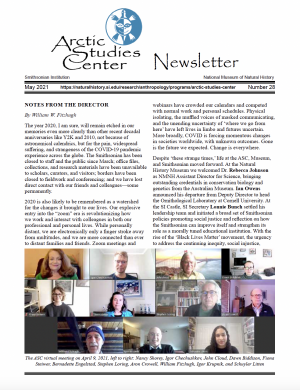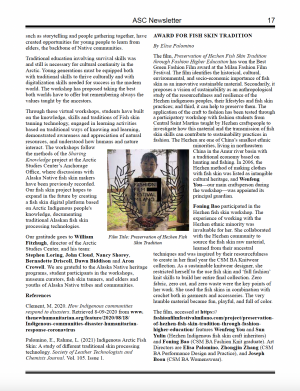Palomino, E., Pardue, J., (2021) A virtual Alutiiq Fish Skin workshop during Covid-19 times. Smithsonian Institution National Museum of natural History. Arctic Studies Center Newsletter. May 2021. N.30.pp-16-17
With a subsistence economy largely dependent on the marine environment and its animal resources, the island and coastal regions of southwest Alaska provide access to a broad range of fish used in the past for clothing production. The traditional Alutiiq wardrobe includes garments made from animal skins, including fish. These garments were expertly sewn by women from Kodiak Island. Traditionally, Alutiiq education consisted of acquiring survival skills: how to navigate the seas in all weathers; hunting and fishing skills; tanning animal skins; and how to repair your fish skin parka while out in the Arctic wilderness. Today, many Alutiiq people continue to provide for their families by subsistence
hunting, fishing and plant gathering. They continue to live in the same territories, using the same resources as they did centuries ago, living in harmony with each other, honoring the ocean and all
of its bounties. Through their traditional Indigenous practices and respect for nature and the animal
kingdom, they live in harmony with nature and with each other to navigate the hardest of times by
listening to their collective wisdom.
https://repository.si.edu/handle/10088/116097
- Palomino, E., Pardue, J., Donkan, A. (2023) Fish skin Peoples of the Bering Strait: Encounters in Hokkaido, Japan. Smithsonian Institution National Museum of natural History. Arctic Studies Center Newsletter. May 2023. N.30. pp.74-75
- Palomino, E. (2022) Indigenous Arctic Fish Skin Heritage: Sustainability, Craft and Material Innovation. PhD Thesis. University of the Arts, London.
- Palomino, E., Cloud, J. (2022) The Arctic as viewed from Florence. Arctic Studies Center Newsletter, Smithsonian National Museum of Natural History.
- Palomino, E. (2021) Fish Skin Coat from the Amur River. TEXT for the Study of the History Art Design of Textiles. V. 48: 2021. The Textiles Society, Pat Frost (ed)
- Trachter, F., Palomino, E., Defeo, G. (2021) Patagonian fish skin tanning processes. XXXVI IULTCS Congress Greening the Leather Value Chain
- Palomino, E., Pardue, J. (2021) Alutiiq Fish Skin Traditions: Connecting Communities in the COVID-19 Era. MDPI Heritage, 4, x. Academic Editor(s): Claire Smith.
- Palomino, E., Pardue, J., (2021) A virtual Alutiiq Fish Skin workshop during Covid-19 times. Smithsonian Institution National Museum of natural History. Arctic Studies Center Newsletter. May 2021. N.30.pp-16-17
- Palomino, E., Freilich, O., Raine, I. (2021) 'A virtual Ainu fish skin workshop during Covid 19'. Global Fashion conference. Academy of Fine Arts of Warsaw. ISBN: 978-989-54263-2-4
- Palomino, E., Karadottir, K. (2021) Fish skin, a historical material assimilated as a sustainable material for fashion. In: Fashion: Culture, Craft, and Identity. Brill.
- Palomino, E., Boon, J. (2020) Preservation of Hezhen Fish Leather tradition through Fashion Education. Textiles, Identity and Innovation. Taylor & Francis.
- Palomino, E. (2020) Fashion workshop in Anchorage. Smithsonian Institution National Museum of natural History. Arctic Studies Center Newsletter. May 2020. N.27.pp. 57-58
- Palomino, E., Karadottir, K., Phirry, E. (2020) Indigenous Fish Skin Craft Revived Through Contemporary Fashion. International Foundation of Fashion Technology Institutes Journal. ISSN: 2694-5193
- Palomino, E. Defeo, G. (2019) Material Design Research - Fish skin, a new environmental -friendly material for fashion. Design Research for Change. Design Museum, London ISBN 978-1-86220-369-3
- Palomino, E. Rahme, L. Karadottir, K. (2019) Indigenous Arctic Fish skin clothing traditions: Cultural and ecological impacts on Fashion HE. CUMULUS Conference Rovaniemi. ISBN 978-952-337-158-3.
- Palomino, E. (2019) SDG 14 Life Below Water Introducing Fish Skin as a Sustainable Raw Material for Fashion. In: Franco I., Chatterji T., Derbyshire E., Tracey J. (eds) Actioning the Global Goals for Local Impact. Science for Sustainable Societies. S


